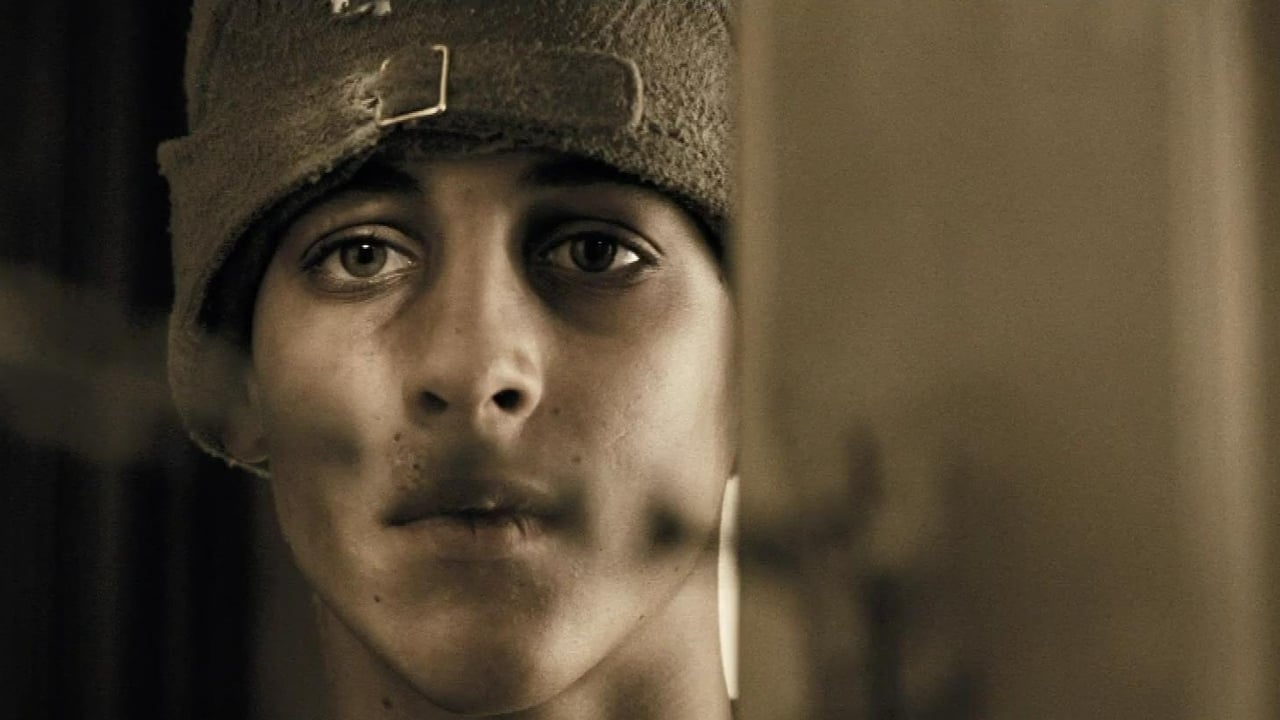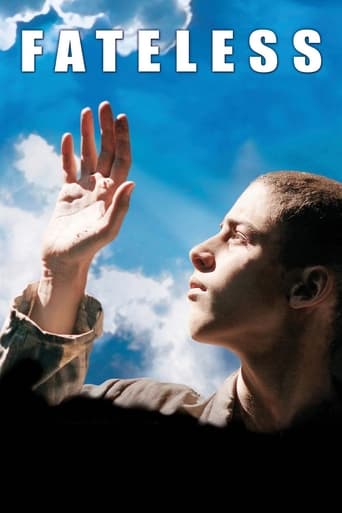

"The moving image carries such a poor information load, and suffers from such discursive weakness, that there is no way to do a meaningful history on film." – Ian Jarvie (sociologist)Released between Volker Schlöndorff's "The Ninth Day" and Marek Najbrt's "Protektor", Lajos Koltai's "Fateless" is yet another Holocaust "death camp" movie. The film was based on an excellent novel by Nobel Laureate Imre Kertesz, but this was Koltai's directorial debut, and it is clear that he is far too small an artist (who isn't?) to handle, not only such a weighty topic, but the gentle wisdom of Kertesz's novel.It is 1944 and we open in Budapest. Hungary has recently sided with Germany and the Nazis are in the process of taking over the Hungarian government. Our hero is 14 year old Gyuri Kove, whose father is preparing to go to a "labour camp". Tears are shed, but the family remain optimistic. They will meet again. Surely.Gradually, however, Gyuri's ordinary adolescent life morphs into a beautifully lit nightmare. He is forced out of school, forced to work and is then, when en route to work one day, ordered off a bus by a local policeman. The scene is chilling in its normality, the policeman stopping several other buses and removing, quite politely, Jews from them all. The policeman himself doesn't know what's going on. Surely it's just a routine inspection. Some sort of benign policy from above. Surely.Unfortunately Gyuri soon finds himself heading for Auschwitz, though he stops at a series of German camps first, including Buchenwald. At Auschwitz, Gyuri undergoes an existential rights of passage of sorts. Too secularised to perceive himself as a "Jew", Gyuri gradually renounces, not a belief in the "Jewish faith", but in "the Jewish fate". He will thus be fateless, his destiny written second by second. "I could be killed, anytime, anywhere," Gyuri muses, this acceptance allowing him to achieve both a state of denial and a level of Bressonian, existential transcendence. Transcendence in the sense that he believes himself able to rise above, block out and weather the brutalities of the Nazis, and denial in the sense that he seems unaware that his survival is brought about, not by self-determination, but by the compassion of others.What's interesting is the way the film revokes the idea that the death camp experience was a uniform experience. The film is implicitly about the camps providing not only horrors and terror, but family, kindness and support. The film is attempting to humanize the dehumanized, but Gyuri knows that no one will ever ask him about the "happy" aspect of his death-camp experience. It is a secret which he must carry privately, never spoken of.Gyuri's eventual liberation from the camps (by American and British soldiers) is itself portrayed as a painful experience. He returns home like a ghost back from the dead, everyone urging him to forget the ordeal he has undergone. "I can't give orders to my memory," Gyuri moans, but the truth is, his voice could never articulate his memories anyway.So Gyuri is not your typical Holocaust hero who ends his film thoroughly traumatised, his innocence lost, but one who receives a different kind of hardening. Gyuri refuses to monumentalize his experience, refuses to describe it in any facile way and rebukes others for describing his ordeal in otherworldly jargon ("the seventh circle of hell"). What he achieves is an existential numbness. A sense of total and whole detachment ("The Holocaust can kill me but it can't make me care," to twist a line from "Full Metal Jacket's" tag-lines). It was what it was because things happened which should not have happened but which did. The film is Gyuri's subjective account of him achieving a kind of dispassionate objectivity or Zenlike flatness.Which brings us to a problem typical of Holocaust films. While the first half of the film is excellent, once Koltai takes us to the camps we realise that he increasingly struggles to convey the inarticulable. Aware that such traumas can not be conveyed by literal or pseudo-documentarian means (you can't starve your extras to give them a suitably degraded, skeletal appearance), Koltai wisely relies on an impressionistic tone, hiring Ennio Morricone for his soundtrack and relying on that highly stylised form of impressionism that was common in late 90's European Holocaust movies (in the US alone, 30 Holocaust movies were released in 1999), the idea being to convey both a sense of incommunicability and some intangible "truth" or "essence". Unfortunately he's not able to do this, the film degenerating into a series of regurgitated and clichéd "holocaust moments" and "visuals signposts". It's the equivalent of Holocaust Tourism. When genocide starts to become generic, you know you're species is well and truly lost.7.9/10 – Italian directors (specifically between 1969-77) seem to be the only ones to have consistently made successful films about the Holocaust, perhaps due to the social/historical/cultural cocktail at the time, and their proximity to and complicity in the event. Outside of Italy, only directors who approach the subject from a totally abstract angle manage to say anything with substance (ironically, some of the best of these films are exploitation or snuff films). This rather low budget film, like "The Pianist", possess a very good first act, but once we hit the camps, we descend into the usual mixture of cookie-cutter horror and sentimentality. Read Kertesz's vastly better book instead.Worth one viewing. See Marek Najbrt's "Protector".
... View MoreThe films about Shoah are steps of a staircase. Different colors, personal texture but same essence. The facts, the suffering, resistance and fear, tears and hope are only nuances of a single image. So, not the aspects of terror are surprising but the way to self-definition, the gleam of miracle."Sorstalansag" is, in great measure, unique. Not for story, acting or lights but for the exploration of world's soul in a delicate subtle manner.In some moments, it is a poem, about God and His discovery, step by step.It is a mute cry and definition of classic social dough. A description of faith and people, symbols, places and taste of reality beyond the flavor of ordinary candies.The glance of Marcell Nagy is more than result of splendid acting. It is unveil of the essence of a old and putrefied world, the real image of social nooks, the bricks of fear and narcissism, self-protection and affective mud, definition of identity.Not the Nazis are pieces/instruments of hell but the others, neighbors, fellow countrymen, Hungarians dabblers for who the other is perfect scapegoat, the victim, the litter or ordinary ware.For me, this film was an profound experience and its author is the art of Imre Kertesz for show the niggardliness of a time in a novel and screenplay.A war with the images, memories and realities. A testimony in a cruel subtle manner. Anatomy of truth and definition of a chaotic universe. Shadows of Hieronymus Bosch and flavors from Dostoevsky.And young Gyorgy Koves as judge, testimony and victim of a strange miracle. In fact, the conscience of a lost corpse, sign of lost hope.
... View Morei think this is a must see movie for all those who have their opinions about the Holocaust n the wars around the world. the director has used very minimalistic movements int he entire movie and has managed to achieve the best form of storytelling . i think the movie is an excellent piece of a Good screenplay and cinematography . this movie truly deserved the awards it got. also since i got the DVD it had a bonus section where the writer (he even wrote the novel ) has many things to say and also says something about Steven Spielberg's 'schindlers list'. well all are entitled to their own opinions but overall the tag line of the movie...you cannot forget remains true a moving experience!
... View More'Sorstalansag' (FATELESS) is an inordinately powerful, quiet journey through a year in Nazi Concentration Camps at Auschwitz, Buchenwald, and Zeitz. Adapted by Imre Kertesz from his first novel, the story is semi-autobiographical as Kertesz spent a year of his youth in Auschwitz as a Hungarian Jew. Though Kertesz alters his novel of the life of one Gyorgy Koves, in a manner he carefully explains in one of the featurettes accompanying this DVD, the observational skills and tenor of his literate mind suffuse this surprisingly quiet depiction of life in a death camp.We first meet Gyorgy Koves as a curly headed handsome 14-year old youth in 1944 bidding farewell to his beloved father as he departs for a labor camp. Wearing the yellow star of David proudly, Gyorgy has little understanding of what it is to be a Jew, a lesson he will learn in the coming year and affect his perception of the world and his place in it. Gyorgy's mother left his father and his father has remarried and requests that Gyorgy stay with his stepmother while he is away 'for a while' in the labor camp. Gyorgy is conflicted as he loves his mother but he does as his father requests. Almost inadvertently Gyorgy and his friends are taken off a bus and separated by the Nazis into trains bound for concentration camps. Gyorgy remains relatively naive about what is happening: his head is shaved, his worldly goods are absconded, and he begins the hellish life of survival in Auschwitz. Where Kertesz writes differently than other authors who have described Holocaust conditions is in his mindset of Gyorgy: Gyorgy strives to retain a sense of equilibrium in this bizarre new life, seeing certain events as probable errors, mistakes, or simply 'the way things are'. He endures starvation, brutal work, pain from an injured and infected knee, boredom, and observing sights of torture of his fellow prisoners. Though he is walking in a stunned world, he is still able to fine the little moments of 'happiness' because of his youthful outlook and creative mind. He gradually grows to understand what being a Jew means, and while he is unable to fathom all he sees in captivity, he learns that if he can't understand life in a concentration camp, how can he understand life outside either. Gyorgy is literally on the carts moving toward the crematorium when the Allies free the camp. He meets an American (Daniel Craig) who suggests he not return to Budapest, but go to America instead where he can pursue a new existence. Yet Gyorgy's devotion to family, to country, and to being a Jew returns him to Budapest where he finds a destroyed city that had been home and wanders the town square trying to make sense of it all.As Gyorgy Koves, Marcell Nagy gives a stunning performance, a picture of a child/man who is forced to enter the world of adulthood via the horrors of Auschwitz. Nagy captures the essence of the character with minimal dialogue and maximum use of his body language and eyes. The supporting cast is superb, each creating vignettes in the few moments we see them that burn into our memory. The cinematography by Gyula Pados uses subdued color for the scenes outside the camps and a subtle sepia toned black and white or the scenes within the walls of the terrifyingly real buildings and yards of the camps. The musical score by Ennio Morricone sustains the mood throughout. But it is the director Lajos Koltai whose impeccable sensitivity to Kertesz' writing and vision that makes this long (140 minutes) film a seamless pondering of the passage of time - minute by minute, hour by hour, day by day, etc - that is the essence of Gyorgy's survival of a nightmare 'with little moments of happiness wherever they may happen'. This is a magnificent film, by a gifted crew, and though it contains visuals that will crush your heart, it must be seen to be believed. In Hungarian and German and English with subtitles. Highly Recommended. Grady Harp
... View More